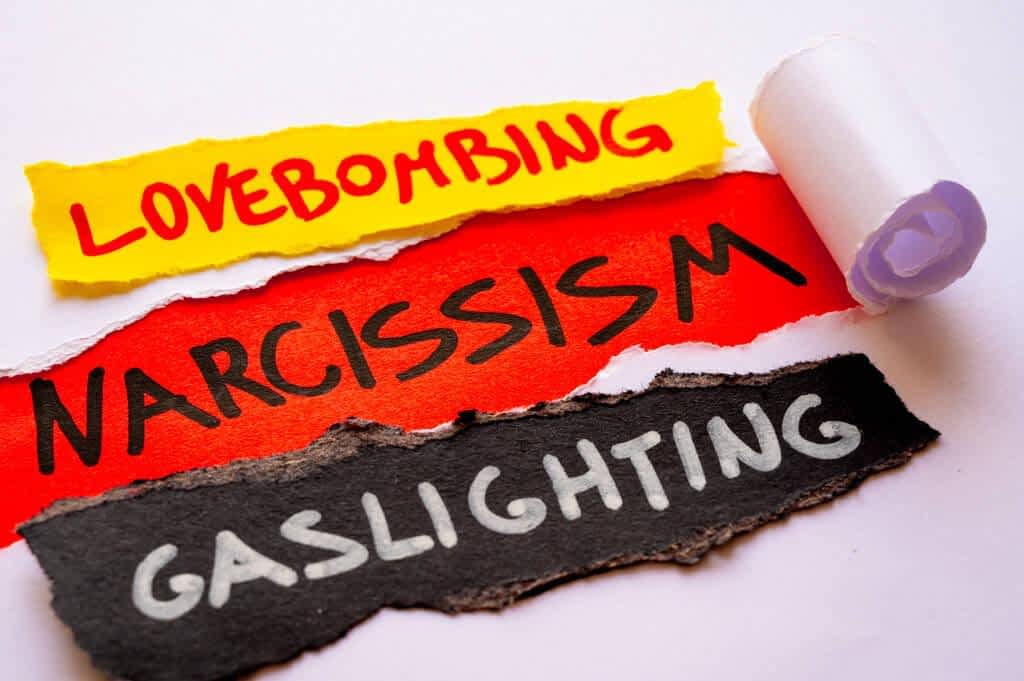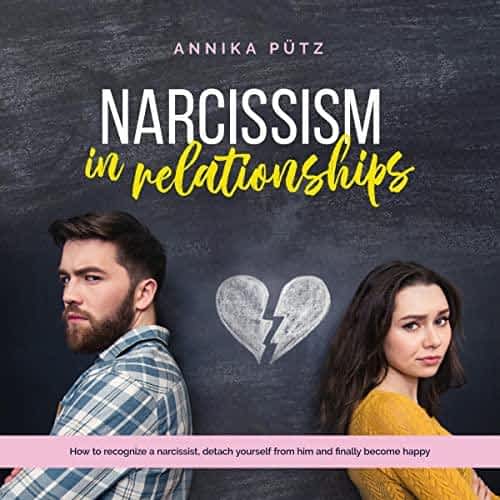Narcissism Uncovered: 10 Toxic Traits of a Narcissist You Can’t Ignore
Ever felt like you were losing yourself in a relationship, like your reality was constantly being twisted, your confidence chipped away, and your voice slowly silenced? If that hit a nerve, you’re not alone. These experiences often point to something deeper and more dangerous than just a “bad partner.” We’re talking about narcissism.
Narcissism isn’t just someone who loves taking selfies or talks about themselves too much. It runs much deeper. The traits of a narcissist can be subtle at first, but they have a way of turning love into confusion and connection into control. Narcissistic Personality Disorder (NPD) is a key part of what’s known as the Dark Triad, alongside Machiavellianism and psychopathy. And when you’re in a relationship with someone like this, the damage doesn’t just stay on the surface. It digs into your sense of self.
Today, we’ll talk about the traits of a narcissist, how narcissism creeps into relationships, and most importantly, how to recognize it and start finding your way out.
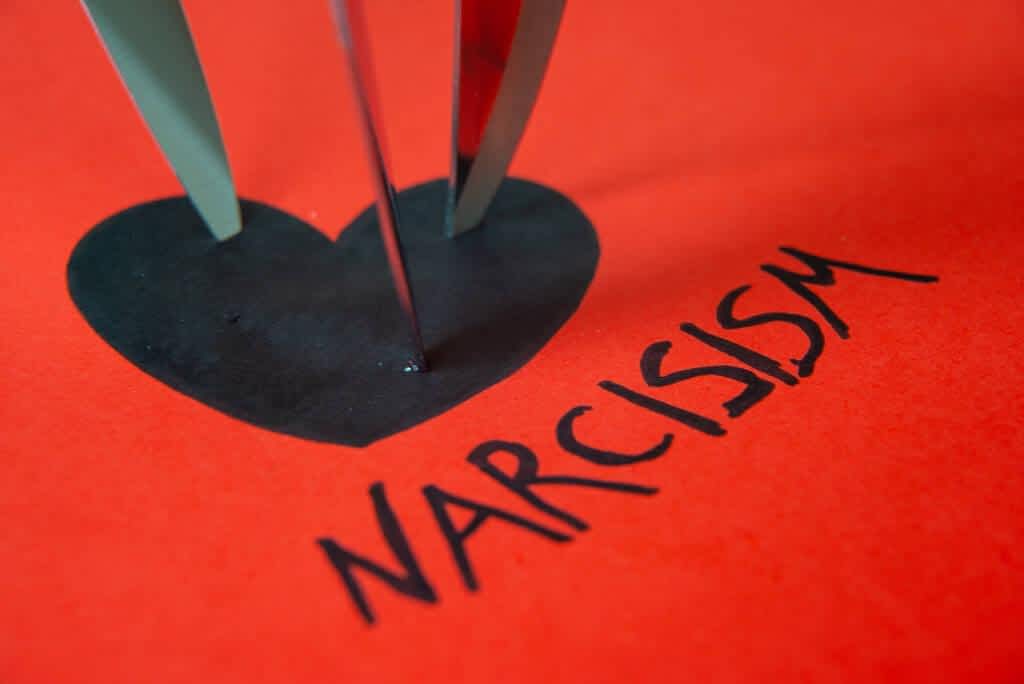
Key Highlights
- Why narcissism isn’t just about confidence
- How charm turns into control
- The slow erosion of self in toxic dynamics
- What happens when you finally say no
- Why recognizing the pattern changes everything

How Narcissism is Part of the Dark Triad
The Dark Triad is a term in psychology that refers to three overlapping personality traits: narcissism, Machiavellianism, and psychopathy.
💔Out of all the behaviors in the so-called Dark Triad, narcissism tends to hit the hardest in relationships, because it hides in plain sight. It wears a smile, flatters you, mirrors your dreams, and then slowly dismantles your sense of self.
What makes narcissistic traits so damaging is that they often start out looking like confidence or charisma. Narcissists can be magnetic. They know how to say all the right things, at least in the beginning. But underneath that charm lies something else: a deep need to be admired, a sense of superiority, and a shocking lack of empathy. They don’t just want to be loved – they want to be worshipped. When that admiration fades, or you start to see cracks in the armor, the manipulation ramps up big time.
This is where the traits of a narcissist really show themselves. You’ll notice the double standards. They can criticize you endlessly, but any feedback you give is seen as an attack. You’ll feel like you’re walking on eggshells, constantly trying to keep the peace, to avoid their wrath, or earn back the version of them you met at the start. That version of them being kind and loving – was bait.
In the the framework of the Dark Triad, Narcissistic Personality Disorder becomes a tool of control. These people don’t just want attention; they want power. Narcissistic traits are rarely obvious until you start questioning your own reality. By then, the damage may already be done.
Being aware of these patterns is the first step toward reclaiming your voice. When you can name what you’re experiencing, you can start to unhook from it. And that’s exactly what we’re doing here – getting real about the traits of a narcissist, how narcissism plays into toxic dynamics, and how to begin your way back to freedom.
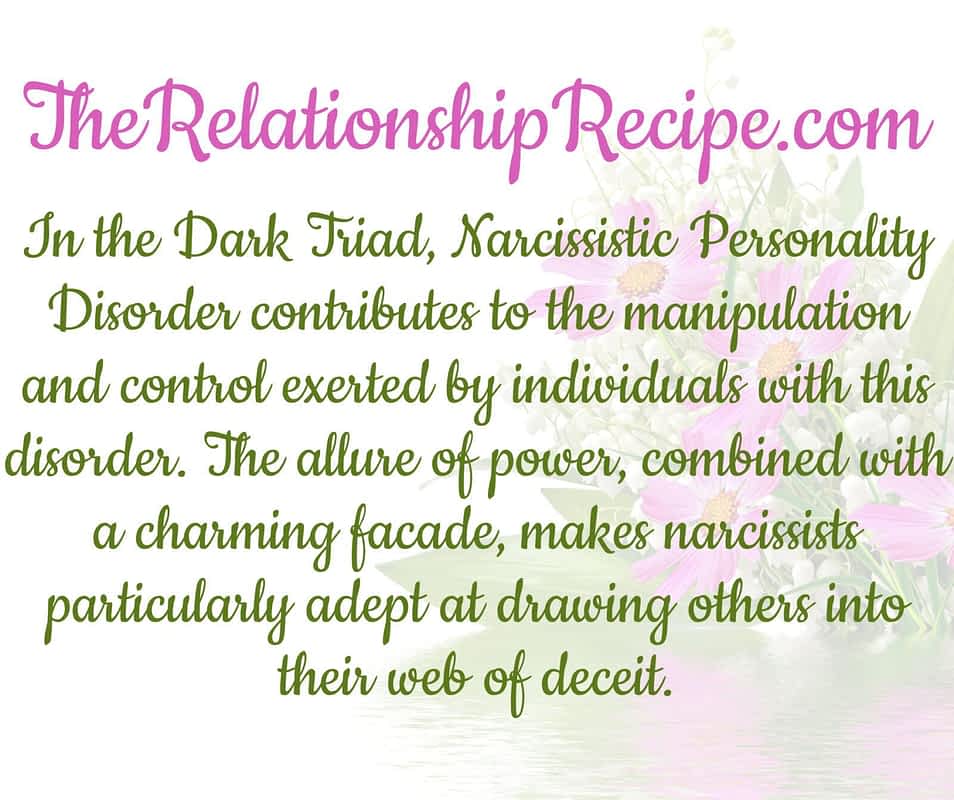
The Negative Impact of Narcissism on Relationships
Being in a relationship with a narc doesn’t feel like love, it feels like emotional survival. It’s exhausting. You’re constantly trying to meet their needs, avoid conflict, and somehow hold everything together, even though you’re slowly falling apart inside.
A narcissist isn’t wired to meet you halfway. Their world revolves around them, and their needs and wants. Your feelings, your boundaries, and your emotional well-being are often dismissed or used against you. The relationship turns into a one-sided dynamic where you’re more of an accessory than a partner.
The constant need for praise and control leads to some of the most common narcissistic traits in relationships: manipulation, stonewalling, silent treatment, emotional withholding, and gaslighting. Over time, this slowly chips away at your confidence and sense of identity. No matter how much love, effort, or understanding you offer, it’s never enough.

The Narcissistic Relationship Pattern
Understanding how narcissistic relationships unfold is key to spotting the red flags before you’re in too deep. At first, it might feel like you’ve finally met someone who gets you. This phase, known as love bombing, can feel like a whirlwind. They’ll shower you with compliments, affection, and intense interest in you. It’s intoxicating, and that’s the narc’s goal.
Once they feel like they’ve “hooked” you, that charm starts to fade. The compliments get replaced with criticism. They become dismissive, cold, and controlling, especially when you start speaking up or setting boundaries.
This shift is a huge part of the narcissistic relationship pattern. If you challenge them, they may lash out, shut down, or respond with passive-aggressive behavior. You find yourself walking on eggshells, trying to avoid their rage to keep the peace.

Traits of a Narcissist in Relatioships
🚩Grandiosity and Exaggerated Sense of Self-Importance:
Narcissists often display grandiose fantasies about their achievements, talents, or success. They may exaggerate their accomplishments, expecting constant praise and admiration for even the most minor achievements. This need for constant validation can overshadow their partner’s accomplishments and diminish their sense of worth.
🚩Manipulative Behavior and Gaslighting:
Narcissists are adept at manipulation, using various tactics to control and dominate their partners. Gaslighting is a common technique where they distort reality, causing their partner to doubt their own perceptions and sanity. This manipulation is to keep the partner off balance, making them more susceptible to being controlled.
🚩Lack of Empathy:
Empathy is a fundamental aspect of healthy relationships, but narcissists struggle to understand or share in their partner’s feelings. They may dismiss or invalidate emotions, leaving their partner feeling unheard and emotionally neglected. This lack of empathy is a key factor in the emotional toll taken on the non-narcissistic partner.
🚩Exploitative Behavior:
Narcissists often exploit others for their own gain, whether it be financial, emotional, or social. They may take advantage of their partner’s generosity, using them as a means to fulfill their desires without reciprocating. This can manifest in various ways, such as financial manipulation, emotional dependency, or social manipulation to boost their own image.
🚩Intense Reaction to Criticism:
While everyone may feel defensive when criticized, a person with NPD reacts disproportionately, often with rage or intense anger. This hypersensitivity to criticism further isolates the non-narcissistic partner, making open communication difficult.
🚩Shallow Relationships and Superficial Charm:
Narcissists are skilled at creating an initial facade of charm and charisma. However, these relationships tend to be superficial, lacking genuine emotional depth and intimacy. The charm is often a means to an end, serving their self-interest rather than cultivating a meaningful relationship.
🚩Sense of Entitlement:
Narcissists believe they are entitled to special treatment and privileges, often expecting others to meet their needs without reciprocation. This entitlement extends to various aspects of the relationship, like expecting constant attention and admiration.
🚩Difficulty with Commitment and Intimacy:
Genuine emotional intimacy and commitment can be challenging for a someone with NPD. They may resist committing to a long-term relationship, avoiding discussions about the future, and expressing discomfort with true emotional vulnerability. Their fear of being exposed, or limited in their pursuits can lead to a cycle of short-lived relationships.
🚩Control Issues:
Narcissists often crave control in all aspects of the relationship. This can manifest in attempts to control the partner’s actions, decisions, and even social interactions. Their need for dominance can lead to a stifling environment for their partner, robbing them of autonomy in thier own lives.
🚩Isolation from Support Networks:
To maintain control, narcissists may strategically isolate their partners from friends and family. By limiting external influences, they ensure that their partner becomes increasingly dependent on them emotionally, further solidifying their control in the relationship.
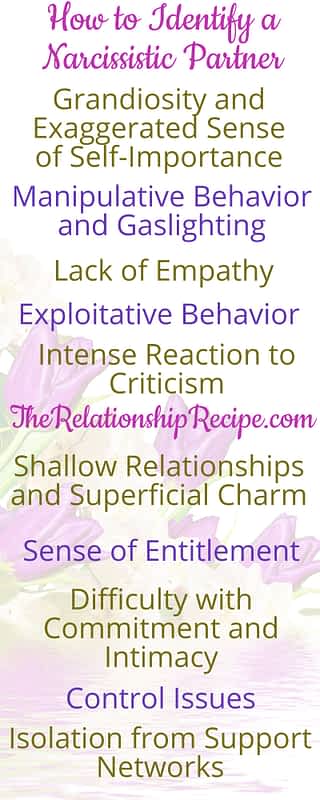
Dealing with a Narcissistic Partner
Dealing with a narcissistic partner can leave you emotionally wrecked, but there are ways to protect your peace and stay grounded. The first thing is boundaries. Real ones. Make it clear what you need, what you won’t tolerate, and be ready to stick to it, because a narcissist will absolutely test your limits.
Don’t try to do it all alone. Lean on people who actually care about your well-being: trusted friends, family, or a therapist who gets it. Having that outside perspective can remind you what’s real when gaslighting makes you question everything.
And most importantly, don’t lose you in all of this. Narcissistic traits can chip away at your self-worth if you’re not careful. Stay connected to the things that light you up, your hobbies, your passions, your people. Grow. Heal. Reclaim your space. You won’t change a narcissist. But you can take back control of your own life, one strong, steady choice at a time.

Leaving a Narcissist: What to Expect and How to Protect Yourself
Breaking free from a narcissistic relationship is an emotional minefield. Narcissists have a deep fear of losing control, and when they sense you’re pulling away, things can get intense fast. At first, they may try to hook you back in. Once they realize you’re serious about leaving, that charm often flips into rage, blame, or emotional warfare.
They might guilt-trip you or play the victim. They may even try to ruin your reputation. It’s textbook behavior that is manipulative, and often cruel. That’s why it’s so important to anticipate these reactions and protect yourself accordingly.

Breaking Free and Moving Forward
Leaving a relationship with a narcissist isn’t just walking away physically. It’s about taking back your life, and your peace of mind. Healing from the damage they cause takes time, but it’s also a wonderful chance to rediscover who you really are outside of their shadow.
Knowing how narcissism fits into the bigger picture helps you spot toxic patterns early and protect yourself from falling into the same traps again.
Before You Go…
Are you feeling emotionally drained, stuck waiting for affection, or constantly questioning yourself? If you’re caught in that exhausting cycle, hoping things will change while knowing deep down they won’t, you might be dealing with narcissism in your relationship.
Do you keep falling for the same type of person, only to end up hurt, used, or full of guilt? Maybe friends have noticed, or maybe you’re finally seeing the pattern yourself. Whether you’re in it now or trying to break free, it’s time to stop blaming yourself and start choosing something better.
If you’re ready for a deeper, eye-opening look at narcissism and narcissistic abuse, especially in romantic relationships, you need to check out this book. It breaks down the patterns, the emotional traps, and why it’s so hard to walk away, even when you know you should. This isn’t just information—it offers clarity, and a serious dose of empowerment.
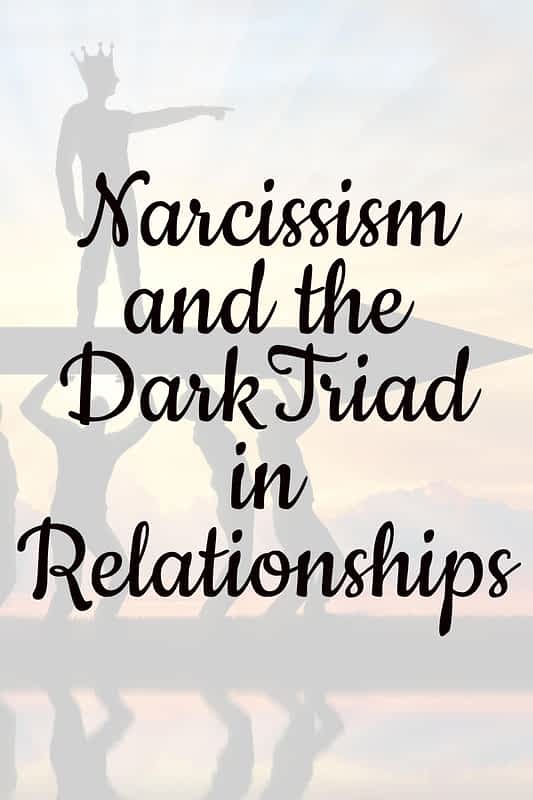
Thank you for reading this post, don't forget to subscribe!

